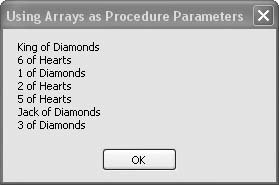Recipe 8.15. Passing Arrays to Methods
ProblemYou want to pass and return arrays to and from methods as easily as other simple variable types. SolutionSample code folder: Chapter 08\ArrayParameters Unlike Visual Basic 6.0, in Visual Basic 2005 it's easy to pass and return any type of object, including arrays. DiscussionThe following code provides a fun example by passing a string array to a function that returns an even bigger string array. The names of the four card suits are placed in a small string array. This array is passed to FillDeckOfCards(), which creates and returns a string array containing the names of all the cards in a deck: Dim result As New System.Text.StringBuilder Dim suits( ) As String = {"Spades", "Hearts", "Diamonds", "Clubs"} Dim cardDeck( ) As String = FillDeckOfCards(suits) Shuffle(cardDeck) For counter As Integer = 0 To 6 result.AppendLine(cardDeck(counter)) Next counter MsgBox(result.ToString( )) The Shuffle() method (designed in Recipe 8.5) shuffles the returned array, and the first seven cards in the array are displayed for review, as shown in Figure 8-15. Of course, your results will vary based on the state of your random number generator. Figure 8-15. Passing and returning arrays The FillDeckOfCards( ) function is passed a string array and returns one, too: Public Function FillDeckOfCards(ByVal suit As String()) As String( ) Dim deck(51) As String Dim cardNumber As Integer Dim suitNumber As Integer For counter As Integer = 0 To 51 cardNumber = counter Mod 13 suitNumber = counter \ 13 Select Case cardNumber Case 0 deck(counter) = "Ace of " Case 10 deck(counter) = "Jack of " Case 11 deck(counter) = "Queen of " Case 12 deck(counter) = "King of " Case Else deck(counter) = cardNumber.ToString & " of " End Select deck(counter) &= suit(suitNumber) Next counter Return deck End Function You may pass and return objects in Visual Basic 2005, a process similar to using Variants in Visual Basic 6.0. But in general, it is better to pass and return explicitly typed arrays, as in the example presented here. This prevents the runtime overhead required for constantly converting variable types, and it helps the compiler determine at compile time if you're attempting to pass incompatible data. In general, consider overloaded methods and generics as two ways to enhance the flexibility of methods, while optimizing the compile- and runtime operations. See AlsoRecipe 8.16 discusses similar functionality. |
EAN: 2147483647
Pages: 400